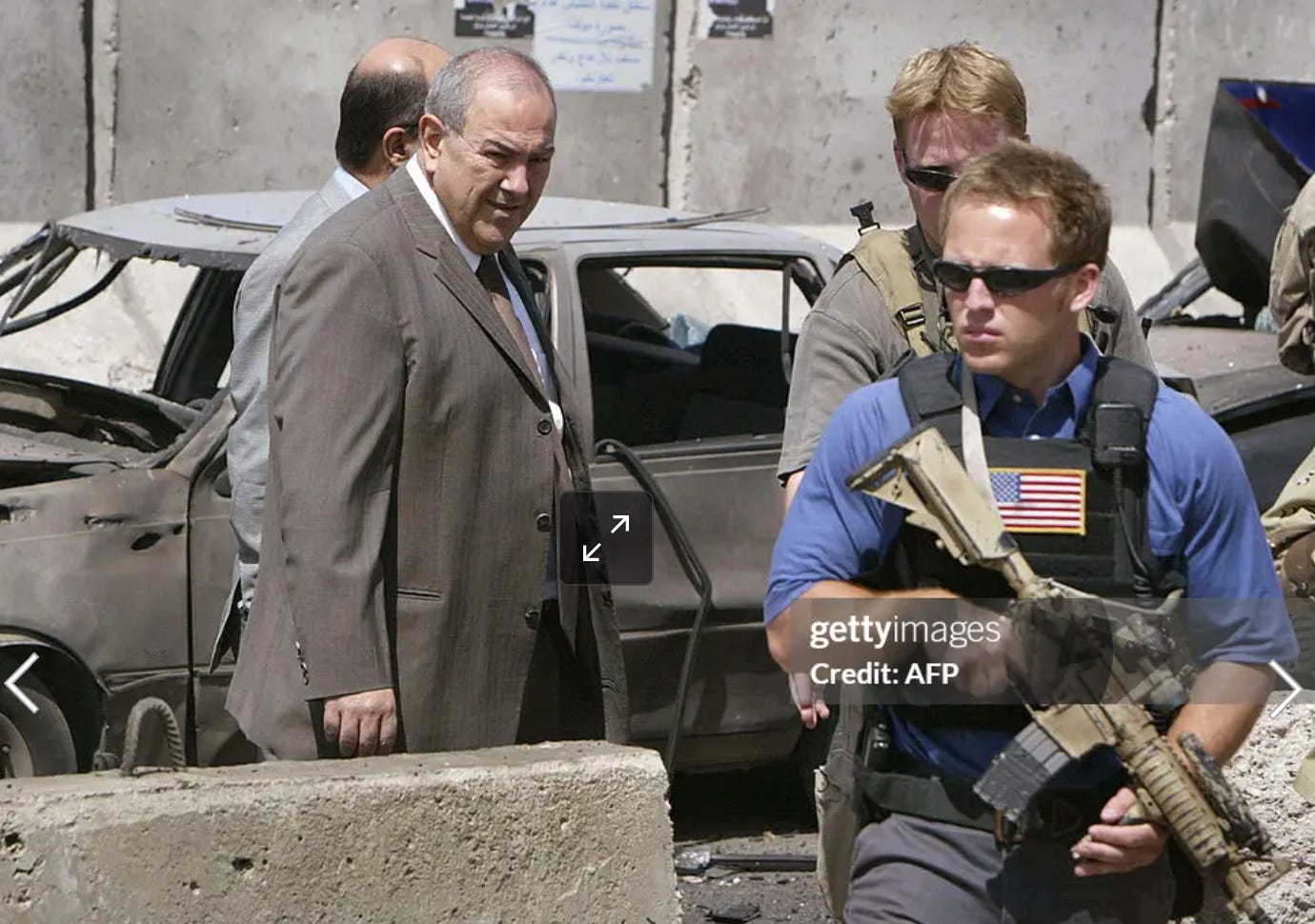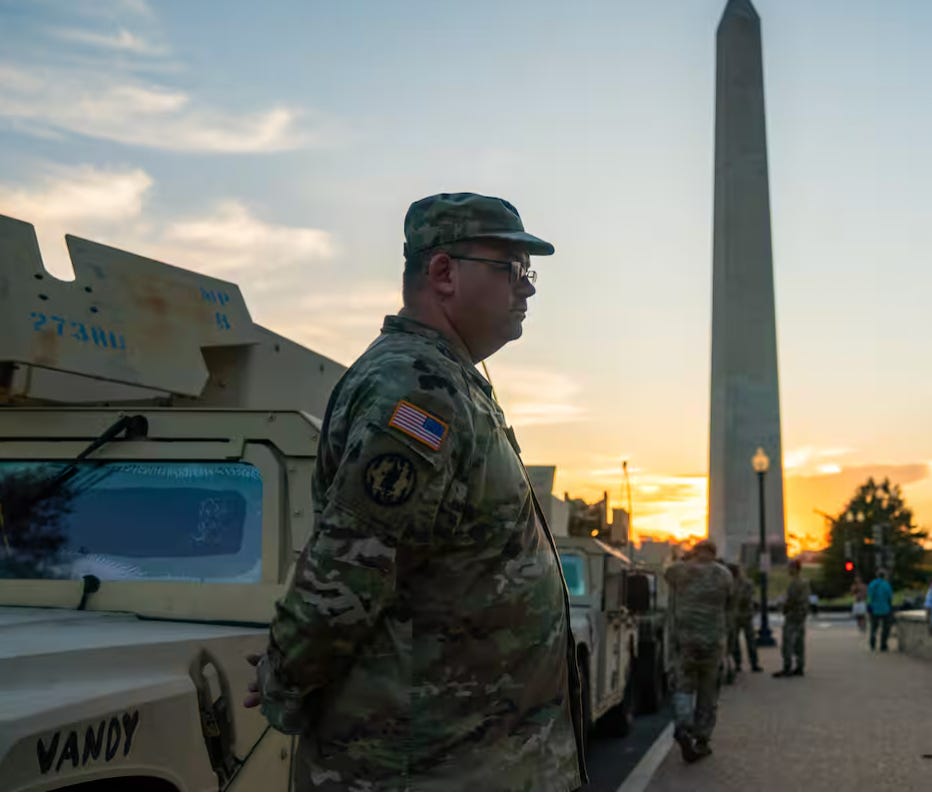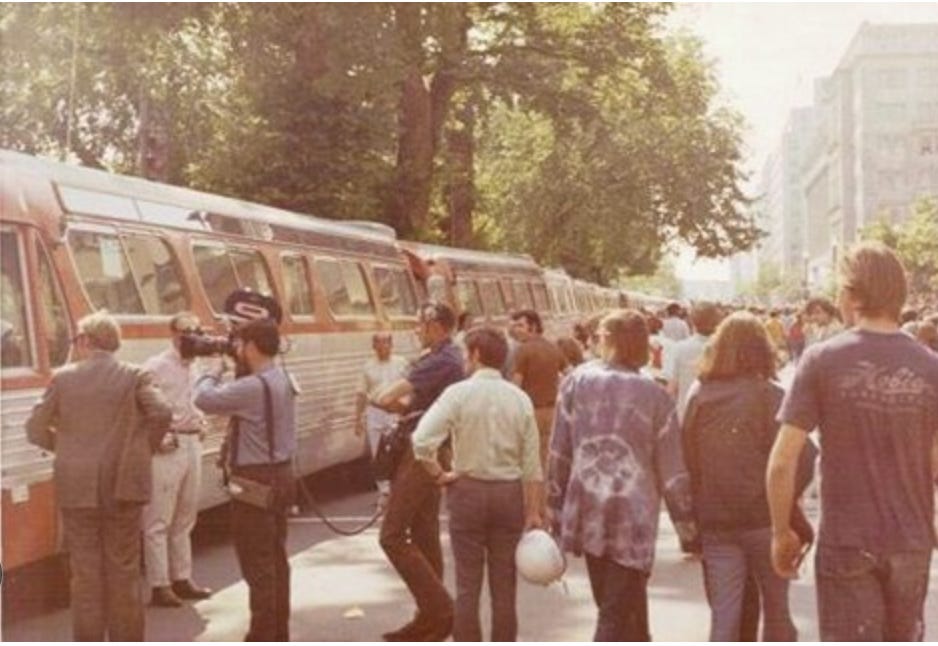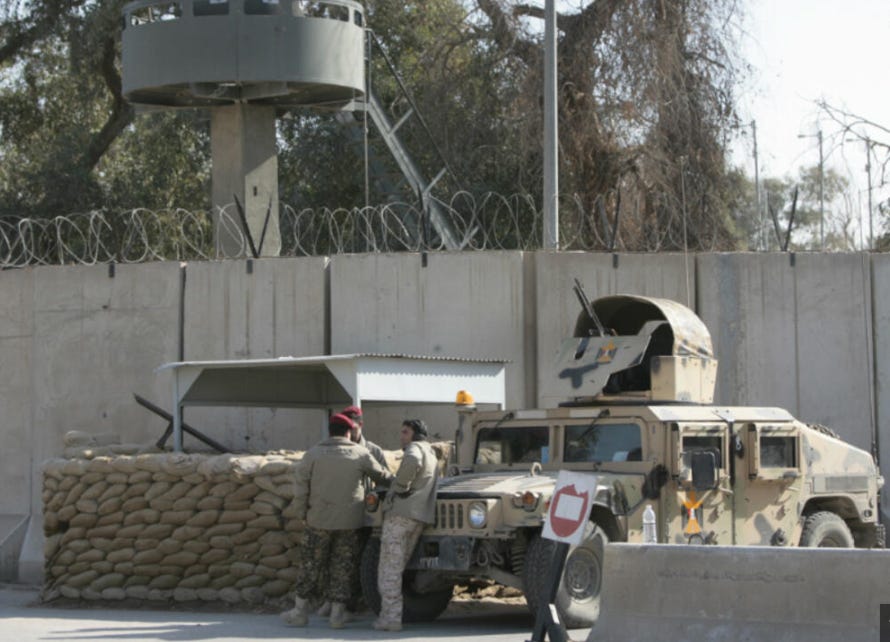臨 OPPORTUNITY
Making Use of the Troops on the Streets of Washington DC
This photo of a National Guardsman on the first day of deployment in Washington DC mid-August 2025 triggered a couple of disparate memories.
The middle-aged soldier is standing near what looks like the intersection of 15th Street and Constitution Avenue NW by the Ellipse. It is just south of the White House grounds and the view is looking south. 55 years ago, in May 1970, I passed through that intersection as part of a demonstration five days after the Kent State Massacre.
This is the view looking North from that intersection. I’m in that crowd somewhere. Instead of a line of Humvees protecting the White House as in the first picture, in 1970 it was DC buses with their tires deflated along 15th St near the White House. In addition, to the National Guard there were also units of the 82nd Airborne deployed on rooftops sighting down on us. It was not a pleasant feeling given recent events.
The aftermath of Kent State was a real crisis, not a manufactured one. Today the Guard is deployed because of “Crime” in the nation’s capitol. But crime is at a thirty-year low so the pretext for deployment is bogus. Although maybe it is a harbinger of a crisis to come shortly, just one more swing of the MAGA axe, relentlessly chopping away the constitutional, democratic norms which have governed American lives until the Trump era.
The other memory the photo triggered was of Baghdad in late March 2004. The middle-aged fellow in the pic reminded me of a National Guardsman I chatted with one day at the outer gate of the Green Zone. He too was middle aged although nowhere near as unfit as the guy above looks.
The man was a school-teacher from near Pittsburgh. I asked him how a Guardsman from western Pennsylvania ended up in Baghdad and that's how I learned about the way the US keeps up its troop commitments.
The Guard is comprised of 54 units — the 50 states plus assorted US territories and the District of Columbia. The National Guard is a part-time force. Most Guardsmen give up a weekend a month and two weeks a year to Guard duty. From this modest time commitment those below officer rank can top up their regular job income by between 4 - 6 thousand dollars. Officers can top up their earnings by around $10,000.
It is a useful way to pick up extra cash — and maybe hang out with the guys — so the average age in the ranks is a bit older than in the regular army.
Each unit is under the civilian control of the state’s governor, although it can be “federalized” in times of national emergency and given tasks. Generally, these involve relief operations during natural disasters. Occasionally they go further. During the Civil Rights and Vietnam War era, when civil unrest was a regular feature of American life, the Guard was often deployed to riot torn cities. It was also deployed on Kent State’s campus. It was a unit of the Ohio National Guard, not regular army troops, that gunned down the four students that May day
But in the forever wars following 9/11 the Guard became more than an auxiliary force, primarily focused on clean-ups after hurricanes or helping local police break up riots. It became an essential source of manpower on the frontline. In Iraq, around 43% of troops deployed were from the National Guard, around a quarter of a million soldiers during the course of the conflict. This explains why, even though he was deep in his 40s, the fellow I was chatting with was standing guard outside the Green Zone.
It was a glorious Middle Eastern spring day, cloudless. Almost a year after Saddam had been overthrown, Baghdad was comparatively placid on the surface. Every place in the city was safe, up until the moment it wasn’t. There was normal hustle and bustle in the abnormal setting of sandbags, blast walls, and zig-zag car barriers at the entrance to the Green Zone complex. People hung around, waiting to be granted admittance or for family members to come out after a meeting.
I was at the Green Zone to interview two members of the Iraqi Governing Council, appointed by the Bush administration’s viceroy in Iraq, Jerry Bremer. Dr. Mahmoud Othman representing Kurdistan and Dr. Muwaffaq al-Rubaie, who was about to become National Security Adviser. The doctor before their names was not an honorific or academic title. Both were MDs, as well as politicians.
Having checked in at the gatehouse I was waiting for a press officer to collect me when I fell into conversation with the high school teacher/soldier.
His world view was formed by Fox News and Rush Limbaugh and we bantered about the politics of the invasion and the reality of Iraq which was tense but had not exploded yet. The conversation was pretty relaxed. He kept a beady eye on the Iraqis hanging around the gate but other than that nothing interrupted the banter.
We exchanged names. Actually, he already knew mine as I had given it at the gate and was waiting for a press officer inside the Green Zone, to come get me.
"I know who you are," he said. Not surprised, very matter of fact.
Really?
"Have to listen to NPR to know how the enemy thinks," he laughed.
It was banter, as I said. Before Trump you could actually joke like this with people you disagreed with politically.
My name was called from the gatehouse and we had an exchange about staying safe. It was very sincere. In my time in Iraq most American soldiers I encountered were surprised and concerned that I moved around pretty much on my own with just an Iraqi translator and no protection of any kind. But I knew my way around the country and Iraqi culture unlike the soldiers who were in uniform and made easy targets. I always thought American troops were in much more danger than I was.
About a week later, literally the day I left the country via Kurdistan, the war re-started in earnest. Fighting everywhere, all the mistakes that had been made since Saddam was overthrown had been simmering away and the pressures suddenly ignited from Sadr City out to Fallujah with the flames fanned by the reports emerging from Abu Ghraib. A little while later I read about a massive car bomb going off right by that entrance to the Green Zone and wondered if that school teacher/National Guardsman/Limbaugh fan was ok.

When I saw the photo in the Post last week, it triggered the memory of that spring day and I thought about the conversation between two Americans who completely disagreed about politics but in the very strange circumstances of a checkpoint in a war zone were able to laugh about their differences.
It also reminded me of what was one of the biggest of the many errors some who were part of the anti-War movement in the Sixties made: a self-indulgent hatred of the military. To be fair that hatred was returned by some our age who could not get out of the draft, or being of draft age had joined the National Guard. Ironically, unlike today, joining the Guard was a way to avoid being sent to the war zone.
There should have been more reaching out to people our age and a bit more understanding of the class element in who actually had to fight the war and who got to sit it out with a student deferment.
There was some, of course. Generalizations about this time are always inaccurate. But the prevailing distrust of the military focused on the enlisted men is wrong at any time. In today’s context, throwing a Subway sandwich at a Guardsman is just plain dumb, even dumber is arresting him for felony assault.
This ridiculous National Guard deployment is actually a great opportunity to do some serious proselytizing. Not all Guardsman on deployment in DC today are MAGA. If you live in the capitol wander on down and engage, banter, gently educate on why the weekend soldiers’ presence is an unnecessary thing. Don't be didactic. Talk about sports and having to give up vacation time for this shit, and empathize a bit, get to know these guys in uniform. Some may already agree with you, some may be confused, some will be MAGA and unredeemable. But this is an unprecedented opportunity to meet outside the confines of social class and social media and build some common ground.
Use it. In the struggle coming very soon, that common ground with soldiers or those who have worn the uniform will be very useful.
And now to go back to my youth one final time. let’s consult the I Ching. There is an opportunity to reach others in this moment of fake crisis with a clown, wannabe dictator as President, supported by a much more disciplined group of fascists trying to destroy our America. This is I Ching hexagram 19. Worth thinking about and taking courage from:
The earth above the lake:
The image of APPROACH.
Thus the superior man is inexhaustible
In his will to teach,
And without limits
In his tolerance and protection of the people.
The appearance of this hexagram marks a turning point, a shift from darkness to light and growth … The hexagram also warns against becoming careless or self-indulgent, reminding us to keep our inner discipline strong and to stay focused on the path of truth … If we meet evil before it becomes reality-before it has even begun to stir-we can master it.
More on Kent State and the National Guard and what real political struggle entails in this program I made for the BBC to mark the 50th anniversary of the tragedy.







Exactly - how often does one have the opportunity to speak directly with the ostensible "other?" << wander on down and engage, banter, gently educate>> yes do a, b and c - be sure to initiate and proceed with focused, zeroed-in listening. Listen closely, then listen some more. Then repeat back what you believe you've heard, to validate and to show that you've been listening. With a dyed-in-the-wool MAGA ("unredeemable") this could be agonizing for the diligent listener. Try anyway because, hell, what have we got to lose. For the agreeable or confused, what a moment! Your sort-of captive audience may respond with some degree of openness, if they feel they have been genuinely heard.
No political expertise here, but an old-hand nurse who enjoyed taking the "most difficult patient" when nobody else wanted them - and not infrequently got the tough ones "eating out of my hand."
Pardon my own pedantics. It's fun to elaborate on your terrific suggestion.
Thank you so much for your reflections on the current state of affairs and how the past is never in the past. I too remember Kent State, being a college student in Cincinnati at that time. It would not be long before I would be seeing my country from the distance of Germany through the eyes of colleagues at a state theater in the state of Nordrhein Westfallen. That experience continues to offer wisdom and even hope in our own fraught time.